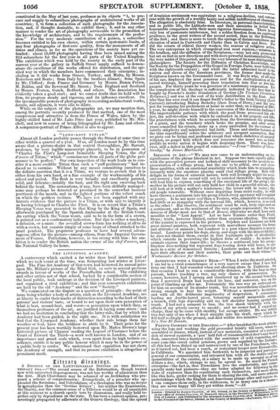A "LONG-LOST TITIAN."
Almost all London probably passes through the Strand at some time or other within a quarter of a year. If so, all London must be by this time aware that a picture-dealer in that central thoroughfare, „Mr. Barrett,
• professes, by very legible manuscript placards, to be in possession of
• "Charles the Firsts Long-lost Inimitable Sleeping Venus, the chef d'oeuvre of Titian," which "connoisseurs from all parts of the globe pro- nounce to be perfect." Our own inspection of the work leads us to con- sider it a more credible Titian than such a "puff preliminary" had in- duced us to surmise. Without by any means committing ourselves to the definite assertion that it is a Titian, we venture to avouch that it is either from his own hand, or a fine example of the workmanship of his school and period. The flesh is very broadly and excellently painted, solid, and delicate—notably the bust, and the right arm swerving back behind the head. The restorations, if any, have been skilfully managed : some may perhaps be detected or presumed in the somewhat luscious prettiness of the mouth, and in the lighted portions of the velvet couch • on which the goddess reclines. We have not been supplied with any historic evidence that the picture is a Titian, or with any to identify it as having belonged to Charles the First. It is on record that a Titian's Sleeping Venus was presented to that King by the King of Spain, and afterwards purchased by the Spanish Ambassador at the British Court. An earring which the Venus wears, said to be in the form of a crown, is pointed out as a confirmatory indication. But this is either a mockery, a delusion, or a snare : the so-called crown-form has nothing at all to do with a crow; but consists simply of some loops of riband attached to the pearl pendent. The proprietor professes to have had several advan- tageous offers for the picture—among others, from the Imperial Govern- ment of France. Patriotism, however, is too strong with him : his am- bition is to render the British nation the owner of the chef d'oeuvre, and the National Gallery its home.


































 Previous page
Previous page